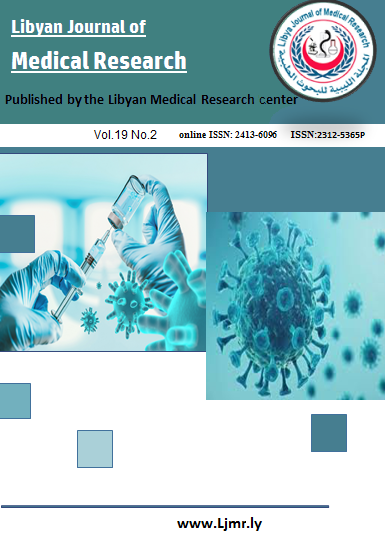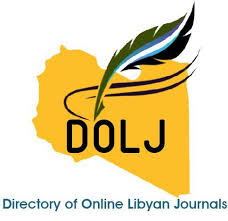Prevalence and Practices of Self-Medication Among Pharmacy Students in Tripoli, Libya
DOI:
https://doi.org/10.54361/LJMR.19.2.33Keywords:
Self-medication, pharmacy students, antibiotic misuse, Tripoli, LibyaAbstract
Background: Self-medication (SM) is prevalent among university students, particularly in pharmacy programs, raising concerns about misuse and antimicrobial resistance. Aim: To assess the prevalence, conditions, treatments, and reasons for SM among pharmacy students in Tripoli, Libya. Material and Methods: A cross-sectional study was conducted from October 2023 to June 2024 at a Tripoli university. Of 140 invited students, 95 responded (67.9%) via a self-administered questionnaire. Results: SM prevalence was 90.5% (86/95), with 89.9% of females and 93.8% of males self-medicating. Headache and common cold (84.2% each) were the most treated conditions, with analgesics (82.1%), antibiotics (67.4%), and vitamins (74.7%) commonly used. The Internet was the primary information source (42.1%). Prior experience with illness (69.5%) and drugs (67.4%) drove SM. No significant gender differences were found (P>0.05). Conclusion: findings of high SM prevalence, especially antibiotic misuse (67.4%), highlight the need for educational interventions and stricter regulations in medicines and health care providers.
Downloads
References
1. Çakmak V, Pakyüz SÇ. METODOLOJİK BİR ÇALIŞMA: AKILCI İLAÇ KULLANIMI ÖLÇEĞİ’NİN GELİŞTİRİLMESİ. Journal of Anatolia Nursing and Health Sciences [Internet]. 2020 Dec 25;498–507. Available from: https://doi.org/10.17049/ataunihem.595394
2. Gyawali S, Shankar PR, Poudel PP, Saha A. Knowledge, attitude and Practice of Self-Medication among Basic science undergraduate medical students in a medical school in Western Nepal. JOURNAL OF CLINICAL AND DIAGNOSTIC RESEARCH [Internet]. 2015 Jan 1; Available from: https://doi.org/10.7860/jcdr/2015/16553.6988
3. Ruiz ME. Risks of self-medication practices. Curr Drug Saf. 2010 Oct;5(4):315-23. DOI: 10.2174/157488610792245966, PMID: 20615179.
4. Montastruc JL, Bondon-Guitton E, Abadie D, Lacroix I, Berreni A, Pugnet G, Durrieu G, Sailler L, Giroud JP, Damase-Michel C, Montastruc F. Pharmacovigilance, risks and adverse effects of self-medication. Therapie. 2016 Apr;71(2):257-62. English, French. DOI: 10.1016/j.therap.2016.02.012. Epub 2016 Feb 6. PMID: 27080848. .
5. Almasdy D, Sharrif A. Self-medication practice with nonprescription medication among university students: a review of the literature. Archives of Pharmacy Practice. 2011; 2(3): 95. PubMed | Google Scholar
6. Lukovic JA, Miletic V, Pekmezovic T, Trajkovic G, Ratkovic N, Aleksic D, Grgurevic A. Self-medication practices and risk factors for self-medication among medical students in Belgrade, Serbia. PLoS One. 2014 Dec 11;9(12):e114644. doi: 10.1371/journal.pone.0114644. PMID: 25503967; PMCID: PMC4263675.
7. Mumtaz Y, Jahangeer A, Mujtaba T, Zafar S, Adnan S. Self medication among university students of Karachi. J Liaquat Univ Med Health Sci. 2011;10(3):102-5.
8. Awad AI, Eltayeb IB. Self-medication practices with antibiotics and antimalarials among Sudanese undergraduate university students. Ann Pharmacother. 2007 Jul;41(7):1249-55. DOI: 10.1345/aph.1K068. Epub 2007 Jun 12. PMID: 17565044.
9. Salama L, Buzariba ES. Self-Medication among Undergraduate Pharmacy Students at the University of Benghazi- Libya. The Scientific Journal of University of Benghazi [Internet]. 2021 Dec 23;34(2). Available from: https://doi.org/10.37376/sjuob.v34i2.3232
10. Sharif N. EVALUATION OF SELF-MEDICATION AMONG PHARMACY STUDENTS. American Journal of Pharmacology and Toxicology [Internet]. 2012 Apr 1;7(4):135–140. Available from: https://doi.org/10.3844/ajptsp.2012.135.140
11. Popoola OO, Adepitan DS, Adeyemi AS, Oladeru OF, Yusuff SI. A national survey of the antibiotic use, self-medication practices, and knowledge of antibiotic resistance among graduates of tertiary institutions in Nigeria. Scientific African [Internet]. 2023 Nov 16;23:e01978. Available from: https://doi.org/10.1016/j.sciaf.2023.e01978
12. Berdnikova V, Lykina T, Bochkaeva Z. Antibiotic self-medication and knowledge about antimicrobial resistance among medical and non-medical students of the University of Dodoma, Tanzania. International Journal of Infectious Diseases [Internet]. 2020 Dec 1;101:47. Available from: https://doi.org/10.1016/j.ijid.2020.09.155
13. Owusu-Ofori AK, Darko E, Danquah CA, Agyarko-Poku T, Buabeng KO. Self-Medication and Antimicrobial Resistance: A survey of students studying healthcare programmes at a tertiary institution in Ghana. Frontiers in Public Health [Internet]. 2021 Oct 8;9. Available from: https://doi.org/10.3389/fpubh.2021.706290
14. Nakato G, Adongo PR, Iramiot JS, Epuitai J. Practices and drivers of self-medication with antibiotics among undergraduate medical students in Eastern Uganda: A cross-sectional study. PLoS ONE [Internet]. 2023 Dec 21;18(12):e0293685. Available from: https://doi.org/10.1371/journal.pone.0293685
15. Raees I, Atif HM, Aslam S, Mustafa ZU, Meyer JC, Hayat K, Salman M, Godman B. Understanding of Final Year Medical, Pharmacy and Nursing Students in Pakistan towards Antibiotic Use, Antimicrobial Resistance and Stewardship: Findings and Implications. Antibiotics [Internet]. 2023 Jan 10;12(1):135. Available from: https://doi.org/10.3390/antibiotics12010135
16. Jamal MY, Ahmed A, Asaad S, Naem I. Evaluating knowledge, attitudes, and practices regarding antimicrobial use and resistance among a group of medical students. Journal of Emergency Medicine, Trauma & Acute Care [Internet]. 2024 Nov 19;2024(5). Available from: https://doi.org/10.5339/jemtac.2024.iscncm.7
17. Lubwama M, Onyuka J, Ayazika KT, Ssetaba LJ, Siboko J, Daniel O, Mushi MF. Knowledge, attitudes, and perceptions about antibiotic use and antimicrobial resistance among final year undergraduate medical and pharmacy students at three universities in East Africa. PLoS ONE [Internet]. 2021 May 7;16(5):e0251301. Available from: https://doi.org/10.1371/journal.pone.0251301
18. Hashemzaei M, Afshari M, Koohkan Z, Bazi A, Rezaee R, Tabrizian K. Knowledge, attitude, and practice of pharmacy and medical students regarding self-medication, a study in Zabol University of Medical Sciences; Sistan and Baluchestan province in south-east of Iran. BMC Medical Education [Internet]. 2021 Jan 14;21(1). Available from: https://doi.org/10.1186/s12909-020-02374-0
19. Al-Taani GM, Karasneh RA, Al-Azzam S, Shaman MB, Jirjees F, Al-Obaidi H, Conway BR, Aldeyab MA. Knowledge, Attitude, and Behavior about Antimicrobial Use and Resistance among Medical, Nursing and Pharmacy Students in Jordan: A Cross Sectional Study. Antibiotics [Internet]. 2022 Nov 5;11(11):1559. Available from: https://doi.org/10.3390/antibiotics11111559
20. Shaghaghi A, Asadi M, Allahverdipour H. Predictors of Self-Medication Behavior: A Systematic Review. Iran J Public Health. 2014 Feb;43(2):136-46. PMID: 26060736; PMCID: PMC4450680.
21. Eticha T, Mesfin K. Self-medication practices in Mekelle, Ethiopia. PLoS One. 2014 May 12;9(5):e97464. doi: 10.1371/journal.pone.0097464.. PMID: 24820769; PMCID: PMC4018272.
22. Sherazi A, Bushra, Mahmood KT, Amin F, Zaka M, Riaz M, Ahmed J. Prevalence and measure of self medication: A review. J Pharm Sci Res. 2012;4:1774-8.
23. Ramazani H, Khalfi A, Heshmati H, Darvishpour K. Prevalence and causes of self medication among students of Torbat Heydaryeh universities. Health Breeze Q. 2015;3(4):24–9.
24. Laroussy K, Castellano Y, Fu M, Baena A, Feliu A, Margalef M, Aldazabal J, Tigova O, Galimany J, Puig M, Moreno C, Bueno A, López A, Roca J, Fernández E, Martínez C. Determinants of participation in an online follow-up survey among nursing students. Journal of Professional Nursing [Internet]. 2022 May 10;41:108–114. Available from: https://doi.org/10.1016/j.profnurs.2022.04.008
25. Reichel JL, Rigotti T, Tibubos AN, Werner AM, Schäfer M, Edelmann D, Pfirrmann D, Deci N, Beutel ME, Stark B, Simon P, Letzel S, Dietz P. Challenge Accepted! a Critical Reflection on How to Perform a Health Survey Among University Students—An Example of the Healthy Campus Mainz Project. Frontiers in Public Health [Internet]. 2021 Jun 21;9. Available from: https://doi.org/10.3389/fpubh.2021.616437
26. Hsin MC, Lin CY, Li HY, Lin SY. Students’ conceptions of health: A cross educational stage survey. Heliyon [Internet]. 2020 Nov 1;6(11):e05383. Available from: https://doi.org/10.1016/j.heliyon.2020.e05383
Downloads
Published
Issue
Section
License
Copyright (c) 2025 Almabrok D. Saeed, Mahmoud B. Agena, Khayri A. Ali, Mohamed D. Said, Mohamed M. Mhimed, Ahmad B. Ajdidi (Author)

This work is licensed under a Creative Commons Attribution-NonCommercial-NoDerivatives 4.0 International License.
Open Access Policy
Libyan journal of medical Research (LJMR).is an open journal, therefore there are no fees required for downloading any publication from the journal website by authors, readers, and institution.
The journal applies the license of CC BY (a Creative Commons Attribution 4.0 International license). This license allows authors to keep ownership f the copyright of their papers. But this license permits any user to download , print out, extract, reuse, archive, and distribute the article, so long as appropriate credit is given to the authors and the source of the work.
The license ensures that the article will be available as widely as possible and that the article can be included in any scientific archive.
Editorial Policy
The publication of an article in a peer reviewed journal is an essential model for Libyan journal of medical Research (LJMR). It is necessary to agree upon standards of expected ethical behavior for all parties involved in the act of publishing: the author, the journal editorial, the peer reviewer and the publisher.
Any manuscript or substantial parts of it, submitted to the journal must not be under consideration by any other journal. In general, the manuscript should not have already been published in any journal or other citable form, although it may have been deposited on a preprint server. Authors are required to ensure that no material submitted as part of a manuscript infringes existing copyrights, or the rights of a third party.
Authorship Policy
The manuscript authorship should be limited to those who have made a significant contribution and intellectual input to the research submitted to the journal, including design, performance, interpretation of the reported study, and writing the manuscript. All those who have made significant contributions should be listed as co-authors.
Others who have participated in certain substantive aspects of the manuscript but without intellectual input should only be recognized in the acknowledgements section of the manuscript. Also, one of the authors should be selected as the corresponding author to communicate with the journal and approve the final version of the manuscript for publication in the LJMR.
Peer-review Policy
- All the manuscripts submitted to LJMR will be subjected to the double-blinded peer-review process;
- The manuscript will be reviewed by two suitable experts in the respective subject area.
- Reports of all the reviewers will be considered while deciding on acceptance/revision or rejection of a manuscript.
- Editor-In-Chief will make the final decision, based on the reviewer’s comments.
- Editor-In-Chief can ask one or more advisory board members for their suggestions upon a manuscript, before making the final decision.
- Associate editor and review editors provide administrative support to maintain the integrity of the peer-review process.
- In case, authors challenge the editor’s negative decision with suitable arguments, the manuscript can be sent to one more reviewer and the final decision will be made based upon his recommendations.















